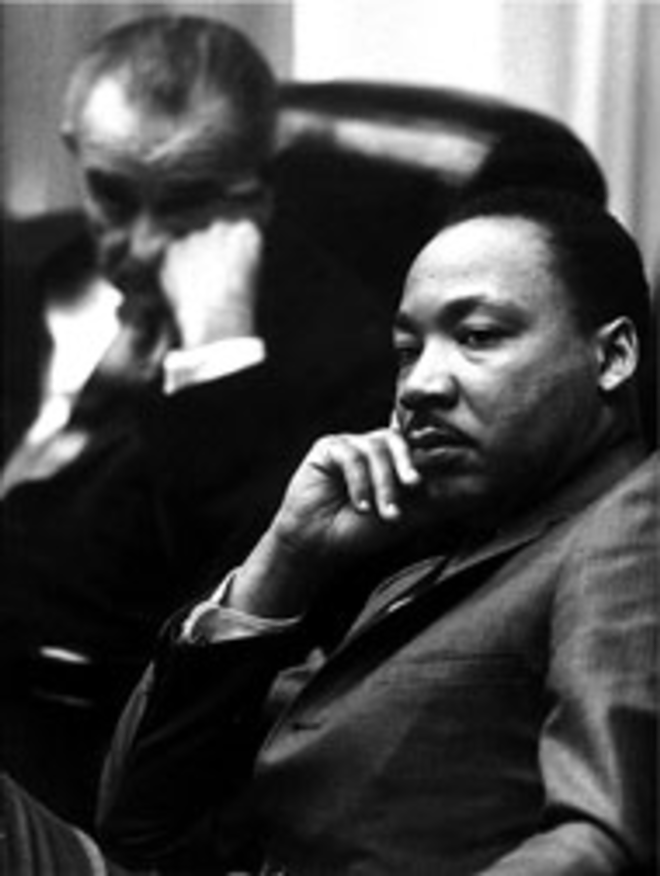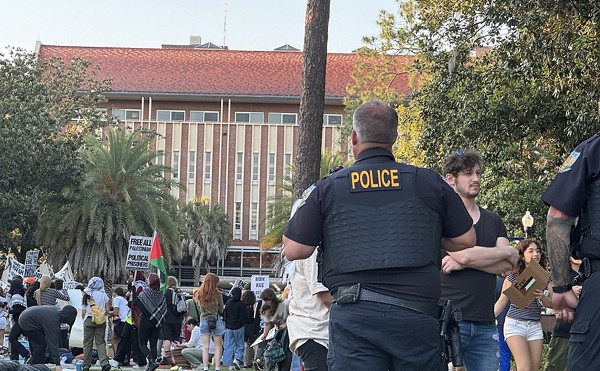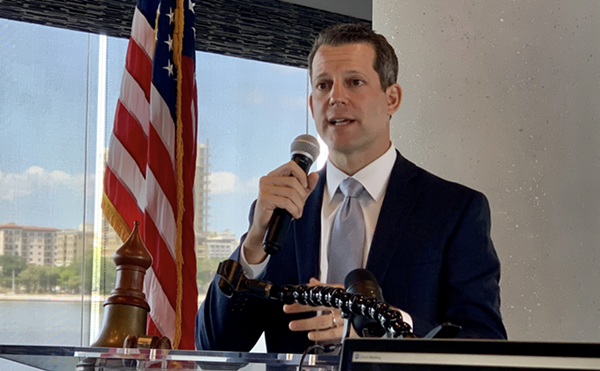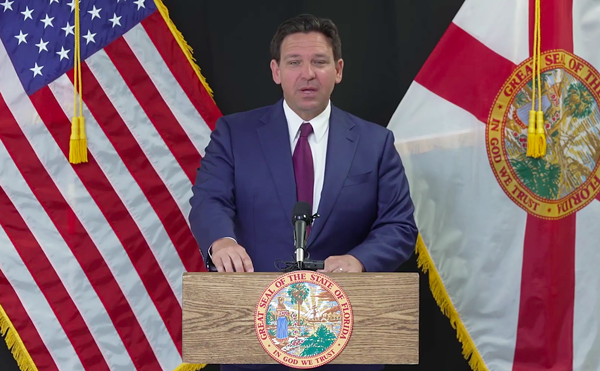
It's hard to imagine a more noxious despoiling of the memory of the Rev. Martin Luther King Jr. than George Bush's butting in on the King Day celebration in Atlanta last year while on his way to stuff his pockets with cash from the South's throngs of neo-cons — that's neo-Confederates.But it was fitting. Even a party that built its base by appealing to rancid racism can now lay claim to King's legacy. The "how" is simple: The real MLK has been all but erased from our history. What's left is so anemic — and so distorted — that even George Wallace or Lester Maddox or, Heaven help us, Zell Miller could claim kinship.
The culprits in this desecration aren't hard to find. However, here's the surprise: They're not the Confederate-flag-waving redneck bigots. Nor are they the more well-heeled racists in the Republican Party.
Rather, the fault lies with the liberal establishment, beginning with Democratic Party leaders who, just as they flee from the true King, ran in panic from men of principle, such as Howard Dean, to embrace the grand waffler, John Kerry. And the perps also include the "liberal" media, where scribes have obliterated the great man's true spirit.
Here's the story you aren't told.
As we celebrate King's birthday — he'd be 76 this year — we could do a lottery on guessing the number of times TV news shows depict his 1963 "I Have a Dream" speech. You'll see plenty of footage from the civil rights marches in Selma and Birmingham. There will be the usual cacophony of chattering heads scratching their chins and ruminating on whether the civil rights movement was a success.
Pay close attention to the broadcast reports and newspapers. You'll notice that discussion of King's life ends somewhere in 1966. Seldom, almost never, will you hear about his post-1966 days, other than a mention that King was murdered in Memphis on April 4, 1968.
Why?
Put another way, why do we ceaselessly hear the "I Have a Dream" speech, while we never are enlightened with the equally moving "Beyond Vietnam" speech King made at New York's Riverside Church a year before his death. The message King thundered was revolutionary — a word I am very specific in choosing. He declared:
"If America's soul becomes totally poisoned, part of the autopsy must read 'Vietnam.' It can never be saved so long as it destroys the deepest hopes of men the world over."
Substitute "Iraq" for "Vietnam" and King's words are as true now as 38 years ago.
Civil rights leaders had been muted on the war — and generally avoided the even more dangerous turf of questioning the basic inequalities in America's economic system. The reasons were simple: The movement needed Lyndon Johnson's support, so its strategists, including King for many years, were publicly neutral on LBJ's war. And the backbone of the movement was the liberal establishment, which might want to tweak capitalism a bit but certainly opposed any radical changes.
King was an ever-changing force, a righteous rocket whose trajectory veered sharply left in his last days. He broke with many in the civil rights movement, and declared not only his opposition to Vietnam but his view that the conflict was anathema to American values.Much more important, King realized that racism was only a symptom, that the nation's true struggle was with pervasive economic disparities. He was busy organizing the Poor People's Campaign — a far-reaching movement that called for what amounted to Christian socialism — when he was gunned down in Memphis.
The campaign's wheels fell off under the post-King captaincy of Ralph David Abernathy, but the vision nonetheless had the potential of reshaping America. I'd argue that had King lived — even realizing that weak-kneed liberals would have abandoned him — the campaign's coalition of blacks, poor Appalachian whites, Chicanos, Native Americans and all who truly embrace religious and moral values could have reshaped the nation and world. It's conceivable that an America invested in human rights and economic justice would have quieted the world's suffering — and prevented Sept. 11, 2001.
Current census figures show that unemployment for blacks is more than double than for whites — and the gap is wider than in 1972. Black infant mortality, 146 percent higher than for whites, is greater than in 1970.
Even more troubling, median income for black families was 60 percent that of whites in 1968. It had slipped to 58 percent in 2002.
King would have used taxes to redistribute wealth — just as the Republicans are doing in reverse. He would have fought for housing, education, jobs.
"We're dealing in a sense with class issues," King said. "We're dealing with the problem of the gulf between the haves and the have-nots, between the privileged and the underprivileged. And we're taking on a mammoth job now, and it isn't going to be easy."
Given today's economic picture — and with Bush's imperial war machine making enemies of much of the world — you'd think King's final messages on peace and a wholesale restructuring of economics would be offered as counterpoint to the administration's programs.
But the media is out to lunch. I found five whole mentions of the Poor People's Campaign in the Tampa Tribune and St. Petersburg Times archives, none in recent years. The Tampa Bay area papers had slight mentions of King and Vietnam, but no attempt to link his views to current world affairs.
Remember that on Martin Luther King Day. Rereading his words and contemplating the symbiotic Bush-terrorism world — the evisceration of American workers' wealth, the regime's relentless attack on our liberties — I'll march with the spirit of the real King. Not a liberal, but a revolutionary.
Group Senior Editor John Sugg can be reached at 404-614-1241 or at [email protected].















